Inside Spain¡¯s Civil Guard
Feared under Franco, the 170-year-old force has been reinvented under democracy
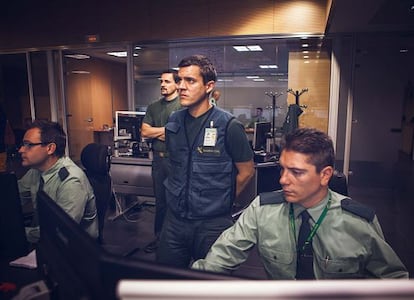
The first security control involves a digital fingerprint reading; the second keying in a number; and each step we take is monitored on CCTV. Our destination is the Civil Guard¡¯s control center, a 6,000-square-metre underground complex opened in 2012 in central Madrid. Unlike the headquarters of the National Security Department underneath the Prime Minister¡¯s official residence, it is not nuclear bomb proof, but it does provide an impressive display of the key role this military force, set up as a rural police corps 170 years ago, plays throughout Spain on land, sea and air.
The nerve center of the complex is the Operations Room, about the size of a theater, and filled with computer-lined desks attended by rows of green-uniformed officers monitoring information provided by the force¡¯s 85,000 officers ¨C just six percent of whom are women ¨C who guard 2,000 control posts and patrol in its 20,000 vehicles, 120 boats, 36 helicopters, and two reconnaissance aircraft.
From here, every mission and investigation the Civil Guard is carrying out can be followed in real time, with constant updates of data that can range from a suspicious license plate to arrests and inside information provided by an informant.
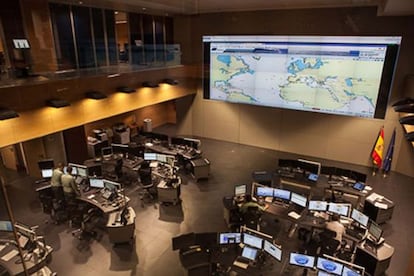
The Operations Room never sleeps, and is supplied with information by security service agents operating internationally, as well as the Civil Guard¡¯s own overseas agents, assigned to embassies, NATO, the United Nations, Interpol, along with those taking part in missions everywhere from Afghanistan to the Central African Republic. From here, in case of a national crisis, the command structure can talk via video conferencing with smaller operations centers in each of Spain¡¯s 17 autonomous regions.
Spain¡¯s coastlines are also monitored from here, as are the country¡¯s borders with France and Portugal, in conjunction with security forces throughout the EU.
The Operations Room is dominated by a 20-meter screen showing an electronic map of Europe stretching from the Balkans to the Atlantic that is constantly receiving information. Along its margin, like some kind of interactive puzzle, are satellite images of the border fences in Spain¡¯s North African exclaves of Ceuta and Melilla, as well as of what is happening on the Italian island of Lampedusa, at Greece and Bulgaria¡¯s borders with Turkey, not to mention real-time footage of a drugs shipment being impounded off Gibraltar. Soon, it will also receive images from Predator drones patrolling Europe¡¯s southern borders.
If you tell a civil guard to wait at his post for eight hours, he does so; a police officer would call their labor union¡± Ex-Civil Guard director general Santiago L¨®pez Valdivielso
The 9/11 attacks changed the way security organizations around the world worked, requiring much closer coordination between them: it is no longer possible to distinguish between internal and external security: ¡°Today, it is impossible to carry out an investigation without help from outside the country,¡± says General Francisco D¨ªaz Alcantud, who headed a 2010 EU mission to train police in Iraq. ¡°The big police operations are always carried out in conjunction with other countries¡¯ forces. The best example of this was the close collaboration with the French state that allowed us to beat ETA. But at any time we might receive information from the US DEA that we will work on and pass on to our colleagues in Italy¡¯s Carabinieri. For many years we were kept out of the loop, and the National Police Force was the main point of contact with Interpol. But today, at last, we are part of a global security network and we work with all the main international police organizations. It has been a long road.¡±
The €20 million command center was financed by Frontex, the EU¡¯s border control agency as part of Brussels¡¯ efforts to combat cross-border crime: the Civil Guard¡¯s €2.6 billion budget, 90 percent of which goes on wages, would never have allowed it to pay for anything like this.
If the Civil Guard has learned one thing over its 170-year history, it is never to look a gift horse in the mouth: it always says yes, and accepts any task assigned to it. Halfway between a police force and an army ¨C a civilian institution run along military lines ¨C it has made the transition from dictatorship to democracy, serving under governments of differing political stripes and maintaining its traditions and code of honor, as laid down in its 1845 rule book: ¡°A Civil Guard, by his cleanliness, good manners, and recognized honor, must be a pillar of morality ¡ honor is the civil guard¡¯s main currency; and as such it must be maintained unblemished. Once lost, it can never be recovered.¡±
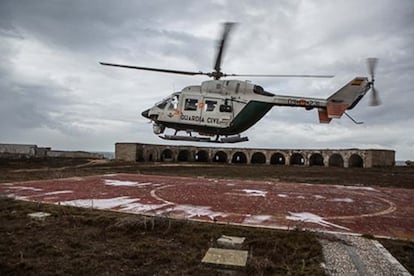
Over the course of Spain¡¯s turbulent last century and a-half of history,?the Civil Guard has faced threats of dissolution, reorganization, demilitarization, and merger with the police. But it has proved indispensable: a presence throughout Spain¡¯s vast and often badly connected territory. It has also shown unswerving obedience to whichever political system or government was in power. When Spain¡¯s military rose up in 1936, it remained loyal to the Republic in Madrid, Valencia and Barcelona, angering General Francisco Franco, who considered dissolving it in 1940, once the war was won. In the end, he brought it under his control by appointing Camilo Alonso Vega, a Civil War veteran who had earned a reputation for mercilessness during the conflict, to head the organization, and setting him the task of liquidating the pockets of maquis resistance that had held out in the mountains of Galicia, Asturias and Le¨®n. The corps became his personal bodyguard, a tradition it has continued under the country¡¯s subsequent heads of state, Juan Carlos I and Felipe VI.
The force has grown in size and resources under successive governments since Spain returned to democracy, even winning over the Socialist Party, who like previous administrations quickly saw its usefulness, particularly in combating ETA. In 1986, Prime Minister Felipe Gonz¨¢lez appointed the first civilian to head the corps, Luis Rold¨¢n, who would obtain more money and resources than Franco ever did. Along the way, Rold¨¢n also stole millions, seriously damaging the Civil Guard¡¯s reputation. He eventually went to prison, but held on to much of the money he had embezzled, and no government since has wanted to look too deeply into how many accomplices within the force also took their share of his ill-gotten gains.
We are low-cost, don¡¯t cause any problems, and we work. But we have no rights¡± Juan Antonio Ramos, spokesman for the Unified Association
During the election campaign that returned the Socialists to power in 2004, among party leader Jos¨¦ Luis Rodr¨ªguez Zapatero¡¯s pledges was a promise to demilitarize the Civil Guard. But when Zapatero took office, his predecessor, Felipe Gonz¨¢lez is reported to have told him: ¡°Jos¨¦ Luis, as for the Civil Guard, don¡¯t touch it.¡± And he didn¡¯t.
As Juan Antonio Ramos, spokesman for the Unified Association, the force¡¯s main labor union ¨C even though its military nature prohibits any such representation ¨C explains, the Civil Guard¡¯s role in combating terrorism and organized crime, as well as its position as the first point of contact with the thousands of migrants who try to make it into Spain via the Canary Islands or the Strait of Gibraltar, has made it indispensable to any incoming government. ¡°We have the information they need, and that gives us power. Every government does its best to get along with the institution, but have ignored the rights of the corps¡¯ members. We too vote, we are citizens, and workers, but we have fewer rights than anybody else.¡±
Ramos explains the popularity of the Civil Guard among Spanish people: ¡°We are low-cost, efficient, and obedient. We don¡¯t cause any problems, and we work. But the reality is that we have no rights. It¡¯s as though some big sports brand were using children in the Third World to sew its soccer balls together. This is how the Civil Guard works, and people should know that.¡±
After the war, civil guards were subject to harsh discipline, lived in appalling conditions, and were usually dead by 50¡± Maximiliano Las¨¦n, retired colonel and local councilor
Santiago L¨®pez Valdivielso, a Popular Party senator and the director general of the Civil Guard between 1996 and 2004, says that during his tenure, the corps was assigned the tasks no other force would take on. ¡°If the government has a political hot potato, it gives it to the Civil Guard to deal with: it was told to control the mad cow crisis, to deal with the arrival of hundreds of boats bringing migrants in illegally, as well as to register the radioactivity of the Tireless, the British submarine that broke down in Gibraltar. Whatever they are asked to do, its officers stand to attention. They can do just about anything. They might be accused of lacking initiative, but that is because the corps has a vertical command structure; it¡¯s top down. And it¡¯s probably true that the people further down could do with having their conditions improved, which is why they are trying to organize themselves.¡±
L¨®pez Valdivieso says that unlike the National Police force, which he accuses of simply paying lip service to its supposed political masters, the Civil Guard might complain about getting handed some mission for which it has no experience or resources, but it will get on with the task. ¡°These people are disciplined, they have military training, and are prepared to make sacrifices and do what they are told, which is very useful for any government. If you tell a civil guard to wait at his post for eight hours, he does so; try that with a police officer and he or she will call their labor union.¡±
A senior member of the Civil Guard¡¯s higher echelons says the government of the day has another reason for not demilitarizing the corps: ¡°If we were incorporated into the police force, that would make for a single security body of 150,000 members, all belonging to a labor union. Nobody could tell them what to do: they could overthrow the government with a strike. In the Civil Guard there can be no counterweight to authority.¡±
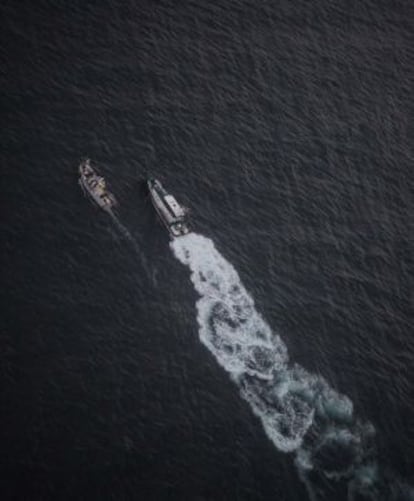
Perhaps the best example of the Civil Guard¡¯s willingness to obey orders was the decision to create a maritime division in 1991: ¡°Nobody around here knew one end of a boat from the other,¡± says Staff Sergeant Rafael Padial, who commands a launch that patrols the Strait of Gibraltar, coming up against smugglers, drug traffickers and clandestine immigration every day. ¡°In the early days we had to use merchant marine captains because we didn¡¯t know how to navigate, but today, there are 2,500 of us.¡±
A few years later, in 1998, the Civil Guard was told to set up an environmental protection unit, Seprona; today it is one of the most effective forces of its kind in Europe.
How did this once rural police force, an instrument of repression for so many years, transform itself into one of the world¡¯s most professional security organizations, with more than 25 different units, responsible for protecting the head of state, the prime minister, and one of the few institutions Spaniards still hold in esteem, according to opinion polls.
Lieutenant General C¨¢ndido Cardiel, the Civil Guard¡¯s second in command after PP-appointed director general Arsenio Fern¨¢ndez de Mesa, says the corps¡¯ success lies in its discipline and its ability to adapt to the changes that have swept Spain over the last four decades: ¡°We are a modern police force that responds to this society¡¯s needs, from jihadists to gender-specific violence. People trust us. And today, we try to provide an ever-better-quality service.¡±
It wasn¡¯t always like this. In the wake of the Civil War, it was a demoralized institution, underfunded, and full of former combatants from Franco¡¯s army. The only investigations it carried out were into rural theft, reports were written on scraps of paper, and officers tramped round the countryside with their aging rifles and a blanket, often sleeping in haylofts or chicken coops. ¡°They were subject to extremely harsh discipline, lived in appalling conditions, and were usually dead by the time they were 50. They weren¡¯t particularly right wing; they were just trying to survive. Their sons and their sons¡¯ sons were civil guards; and their wives were daughters of the regiment. This was an inward-looking organization that didn¡¯t mix with the rest of the population, which was kept apart in dreadful barracks on the outskirts of the village. It was the decision to divide it up into specialist units that injected some modernity into its veins,¡± says Maximiliano Las¨¦n, a retired colonel and Socialist Party local councilor.
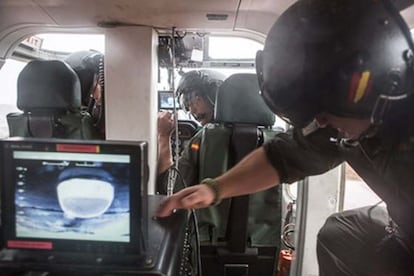
In the years that followed the Civil War, the Civil Guard took over the duties of the Carabineros, which Franco had dissolved. This gave it control of Spain¡¯s borders, which today translates into responsibility for ports, airports, territorial waters, drug trafficking, financial crime, and illegal immigration. In 1959, it took over patrolling the country¡¯s roads from the police.
But after the first ETA attack in 1968, the Civil Guard¡¯s shortcomings soon become evident. More than 200 civil guards were killed in the 35-year campaign of bombings, shootings, and kidnappings that ETA waged in pursuit of Basque independence.
Quite simply, the Civil Guard was not prepared to deal with the challenges of home-grown terrorism. It lacked the resources, training, and the backing of society. It didn¡¯t know anything about undercover work, and its modus operandi in the Basque Country was to undertake military-style patrols that made it an easy target for ambushes; it had no armored vehicles, and it carried out indiscriminate raids. Its approach to information gathering required officers to use their own cars, sometimes disguising themselves as women using wigs ¨C the first female officers did not join until 1988 ¨C while telephone intercepts were transcribed by hand in notepads, and the abuse of suspects in its much-feared barracks in the Basque Country was the norm. There were no computers and poor internal communication. Most of the information it gathered ended up in files that nobody bothered to consult, cross check, or analyze.
After the first ETA attack in 1968, the Civil Guard¡¯s shortcomings soon become evident
The first steps toward modernization were taken by Andr¨¦s Cassinello, a former colonel in Franco¡¯s army. He became the right-hand man of Spain¡¯s first two democratically elected prime ministers, Adolfo Su¨¢rez and Felipe Gonz¨¢lez, and was followed by the Civil Guard¡¯s own Pedro Catal¨¢n, who in the mid-1980s took his lead from Israeli intelligence agency Mossad.
Until the bombings at Madrid¡¯s Atocha railway station in March 2004, the Civil Guard had been focused exclusively on ETA terrorism, and was caught off guard. But since then, the Civil Guard has turned its attention to the jihadist threat.
Lieutenant Colonel Valent¨ªn D¨ªaz has something of the university don about him. Tall, ungainly, wearing a tweed jacket with a dark tie, and sporting the gray moustache typical of so many senior civil guards, he describes himself as unimportant. ¡°Information analysts like myself ask for, and receive little attention. We have no idea about the lives we save: we leave our jobs after years of service with little recognition.¡±
D¨ªaz heads UCE-1, the Special Central Unit Number 1, one of the three branches of Civil Guard Information Headquarters, which is in charge of the fight against terrorism and has a staff of 6,000 officers. His unit fights ETA, UCE-2 fights Islamic terrorism and UCE-3, so-called anti-system groups.
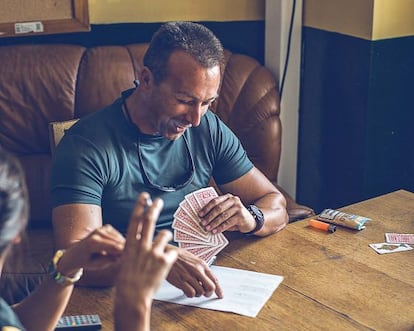
Each of the three units is focused exclusively on garnering information, using a network within Spain, as well as a network of officers abroad. Almost half a century since it took up the fight against ETA, the Civil Guard now finds itself part of the global fight against Islamic terrorism. ¡°With the jihadists we have once again had to start from scratch. It is a very different kind of terrorism to that practiced by ETA: with ETA it was possible to undertake long-term investigations, delay an arrest to gather more information; but with the jihadists, as soon as you have some proof, you act. That is the biggest risk involved.¡±
The conversation with Colonel Valent¨ªn takes place in one of the corps¡¯ most protected installations, an anonymous, impersonal building near Madrid¡¯s Barajas airport. Inside are what are clearly undercover agents, some dressed in smart suits, others wearing leather jackets and Palestinian keffiyehs, many of them women: ¡°Our female agents are key to our success, not just in operations, but in analyzing information and working out strategies. They see things that men don¡¯t,¡± says a senior officer.
Our female agents are key to our success. They see things men don¡¯t¡± A senior civil guard officer
This is where the Civil Guard¡¯s elite operates from: the force¡¯s intelligence agents and investigators, who belong to the UCO Central Operative Unit, tasked with combating international organized crime, often involving money laundering and front companies, as well as drug and people trafficking. The 500 or so agents here are distributed throughout the building¡¯s first four floors; the upper four house the anti-terrorist officers. ¡°As regards the fight against ETA, we have gone from being behind the curve to being right ahead of it. We are able to stop people even before they join the organization, as well as arresting leaders as soon as they take over. This would have been impossible without the cooperation first of the French authorities, which have allowed armed officers to operate on French territory, and then of the National Intelligence Center, which has access to incredible technology, and whose agents have infiltrated ETA. Beating ETA has been a joint effort,¡± says D¨ªaz.
But D¨ªaz warns ETA is not finished yet, nor has the Civil Guard ended its fight against the organization to focus solely on international terrorism. ¡°We haven¡¯t wound down at all. The last phase of any war is to chase the enemy down, and to exploit success to the full. And that is what we are doing now. We know that it still has arms caches in France, and that there are cells whose members lead normal lives, waiting to be activated. Now the time has come to investigate 300 murders that are still unsolved. We have to continue investigating and looking into what happened in the past. There is still a lot to do. But we¡¯ve got more than enough time. We¡¯re the Civil Guard: we¡¯re 170 years old.¡±
Tu suscripci¨®n se est¨¢ usando en otro dispositivo
?Quieres a?adir otro usuario a tu suscripci¨®n?
Si contin¨²as leyendo en este dispositivo, no se podr¨¢ leer en el otro.
FlechaTu suscripci¨®n se est¨¢ usando en otro dispositivo y solo puedes acceder a EL PA?S desde un dispositivo a la vez.
Si quieres compartir tu cuenta, cambia tu suscripci¨®n a la modalidad Premium, as¨ª podr¨¢s a?adir otro usuario. Cada uno acceder¨¢ con su propia cuenta de email, lo que os permitir¨¢ personalizar vuestra experiencia en EL PA?S.
?Tienes una suscripci¨®n de empresa? Accede aqu¨ª para contratar m¨¢s cuentas.
En el caso de no saber qui¨¦n est¨¢ usando tu cuenta, te recomendamos cambiar tu contrase?a aqu¨ª.
Si decides continuar compartiendo tu cuenta, este mensaje se mostrar¨¢ en tu dispositivo y en el de la otra persona que est¨¢ usando tu cuenta de forma indefinida, afectando a tu experiencia de lectura. Puedes consultar aqu¨ª los t¨¦rminos y condiciones de la suscripci¨®n digital.









































